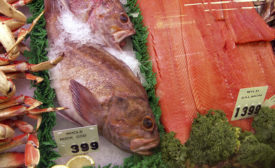Food Safety
Albertsons expands responsible seafood program
This policy sets a bold vision for sustainable seafood across the 2,300-plus stores.
November 2, 2016
Shelf-life extension technology shows food savings
The Food Freshness Card is also effective for shipping containers, walk-in commercial refrigerators, produce markets, storage facilities and more.
October 27, 2016
How transparency helps frozen food manufacturers win
Being transparent sounds simple enough, but the path isn’t so easy for a lot of frozen food manufacturers.
October 25, 2016
World Poultry Foundation helps poultry farmers train their peers
The “train-the-trainer” program teaches local poultry farmers how to produce chickens more efficiently, with particular emphasis on improving biosecurity to help prevent the spread of disease.
October 21, 2016
Walmart launches Food Safety Collaboration Center to promote food safety education, innovation
The center will target research focused on analyzing root causes of foodborne illnesses.
October 20, 2016
New report shows accelerated growth in sustainable seafood supply chain
More than 20,000 products now carry the blue MSC label and can be traced back to fisheries, which meet the MSC’s world-class standard for sustainable fishing.
October 14, 2016
Survey: Americans don’t know how much food they waste
According to the “2016 Food & Health Survey,” about one-third of Americans (30%) say that they “don’t create any food waste.”
October 14, 2016
Elevate your expertise in refrigerated and frozen foods with unparalleled insights and connections.
Get the latest industry updates tailored your way.
JOIN TODAY!Copyright ©2024. All Rights Reserved BNP Media.
Design, CMS, Hosting & Web Development :: ePublishing








